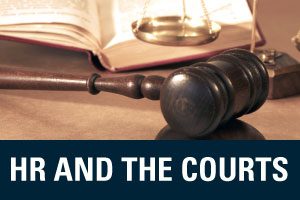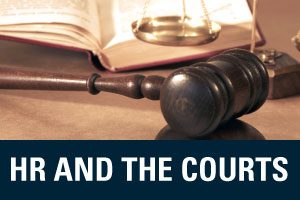Each month, CUPA-HR General Counsel Ira Shepard provides an overview of several labor and employment law cases and regulatory actions with implications for the higher ed workplace. Here’s the latest from Ira.
Fired Professor Who Praised Hitler Loses Free Speech Retaliation Lawsuit
The New Jersey Institute of Technology prevailed in a federal lawsuit brought by a former philosophy lecturer alleging retaliatory discharge. The professor’s employment agreement was not renewed after a New York Times article exposed his involvement in the “alt-right” (a far-right, white nationalist movement), including his praising Adolph Hitler as a “great European leader” and linking IQ to race. In dismissing the lawsuit, the U.S. District Court for the District of New Jersey held that the professor’s speech disrupted, and would likely continue disrupting, the university’s administration and interfered with the university’s mission (Jorjani v. N.J. Inst. of Technology ((D.N.J. No. 2:18-cv-11693, Jud entered 7/31/24)).
The judge held that public employers can restrict the speech of employees without violating the First Amendment when necessary to maintain effective and efficient operations. The judge also emphasized that the university did not need to wait for protests and demonstrations in order to show disruptions in operations before acting.
NLRB: Private Colleges and Universities Must Bargain With Unions Representing Student Employees Over FERPA-Protected Information
On August 6, 2024, the general counsel of the National Labor Relations Board (NLRB) issued a memo acknowledging the potential conflict between the National Labor Relations Act (NLRA) and the Family Educational Rights and Privacy Act (FERPA) regarding union requests for personal information about student employees. The NLRB general counsel concluded that colleges and universities in this situation must bargain with the applicable union over disclosure of such information and explain why the information request would violate FERPA.
Further, the NLRB concluded that the college or university can bargain with the union over the distribution of FERPA waivers to applicable student employees but that asking the union to hand out such waivers would be unreasonable and a violation of the employer’s duty to bargain in good faith because the union does not have the student contact information. The general counsel concluded that the college or university should hand out the waivers when the union does not have the student employees’ contact information.
Proposed $2.8 Billion NCAA Settlement on Hold as Some Student-Athletes Object
Some student-athletes claiming the NCAA artificially capped the size of college athlete scholarships too low, as well as those pursuing fair-pay claims, objected to the $2.8 billion proposed settlement of the NCAA and the Power Five conferences antitrust case. Plaintiffs in these two areas are asking the Northern District of California court to carve out their claims from the proposed settlement so that they can pursue individual claims in further litigation. The federal judge overseeing the matter questioned the proposed settlement and concluded that the settlement needed a better explanation of damages and a clearer understanding of how much each class member can expect to gain (In re College Athlete NIL Litigation (N.D. Cal. No. 4:20-cv-3919. Brief filed 8/9/24, Fontenot v. NCAA D. Colo. No. 1:23-cv-03076, and Cornelio v. NCAA D. Colo. No. 1:24-cv-02178)).
Two former Brown University student-athletes have dropped their objection, concluding it will not preclude them from proceeding separately in an antitrust claim against the Ivy League. The two former men’s and women’s basketball players have alleged separately that the Ivies have engaged in an illegal agreement which raised the price of an Ivy League education by illegally suppressing compensation for their services. They alleged that Brown only provided them with need-based assistance that did not cover the full cost of their education.
Boston University Graduate Workers Strike Is Longest in the Last Decade
Lasting over 150 days, the Boston University graduate workers strike is the longest student employee strike in the last decade, according to the National Center for the Study of Collective Bargaining in Higher Education and the Professions, located at the City University of New York’s Hunter College. The BU strike, which began on March 25, eclipses a similar work stoppage of 147 days at the University of Michigan in 2023. An unauthorized “wildcat” strike at the University of California, Santa Cruz may have lasted longer but the National Center points out that strike was unauthorized by the applicable union. The center concludes that this is part of the significant increase in unionization of both undergraduate and graduate student workers that has occurred over the past few years.
The Boston University graduate workers formed their union in December 2022. The union is still engaged in efforts to secure their first collective bargaining agreement. September 3 will be the beginning of the second semester in which the grad student workers are striking. Teaching and regular higher education functions have continued at the university, though some interference with regular activities has been reported.



